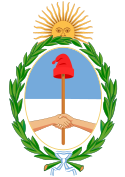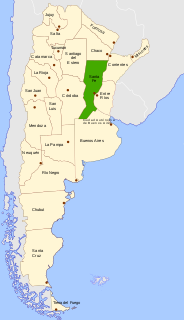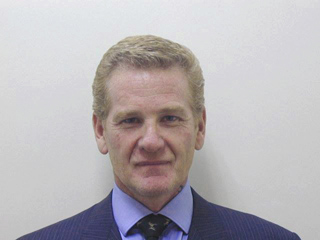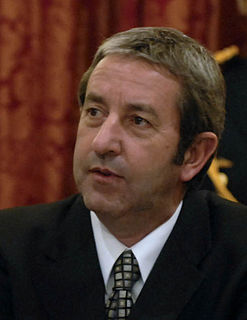The government of Argentina, within the framework of a federal system, is a presidential representative democratic republic. The President of Argentina is both head of state and head of government. Executive power is exercised by the President. Legislative power is vested in both the Executive and the National Congress. The Judiciary is independent from the Executive and from the Legislature.
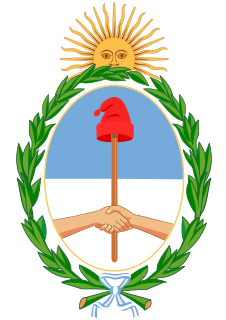
This article is about voting, elections, and election results in Argentina. For details of Argentine government institutions and political parties, see Politics of Argentina.

Hermes Juan Binner is an Argentine physician and a politician. He was elected Governor of Santa Fe in 2007. Binner is the first Socialist to become the governor of an Argentine province, and the first non-Justicialist to rule Santa Fe since 1983.

Felipe Solá is an Argentine politician of the Justicialist Party (Peronism) and was governor of Buenos Aires Province from 2002 until 2007.

Argentina held national parliamentary elections on Sunday, 23 October 2005. For the purpose of these elections, each of the 23 provinces and the Autonomous City of Buenos Aires are considered electoral districts.

José Manuel de la Sota was an Argentine politician who was a member of Justicialist Party. He was the governor of Córdoba Province from 1999 until 2007, and was reelected to the post for the 2011–15 term.

Jorge Omar Sobisch is an Argentine centre-right politician, formerly governor of Neuquén Province. He leads the Neuquén People's Movement and was a candidate for President of Argentina in 2007.

Argentina held national presidential and legislative elections on Sunday, October 28, 2007, and elections for provincial governors took place on staggered dates throughout the year. For the national elections, each of the 23 provinces and the Autonomous City of Buenos Aires are considered electoral districts. Voter turnout was 76.2%.

Agustín Oscar Rossi, also known by his nickname El Chivo Rossi, is an Argentine Justicialist Party politician from Santa Fe Province. He was elected to the Argentine Chamber of Deputies in 2005, and served as leader of the majority Front for Victory caucus in said house. Rossi was appointed Minister of Defense in June 2013.
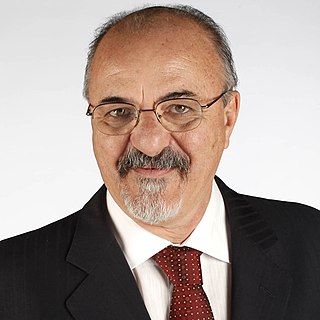
Carlos Alfonso Tomada is an Argentine Peronist politician who served as the Minister of Labor, Employment, and Social Security. Tomada was appointed by former President Néstor Kirchner, and reappointed by President Cristina Fernández de Kirchner.

Argentina held national presidential and legislative elections on Sunday, 23 October 2011. Incumbent president Cristina Fernández de Kirchner secured a second term in office after the Front for Victory won just over half of the seats in the National Congress.
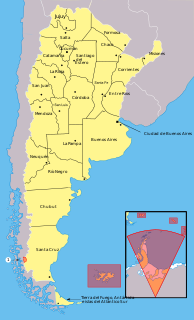
Most Provinces of Argentina held executive and legislative elections during 2011, electing Governors and provincial legislatures. The only exceptions are Santiago del Estero Province, whose executive and legislative elections were elected in 2012; and Corrientes Province, whose governor election was elected in 2013.
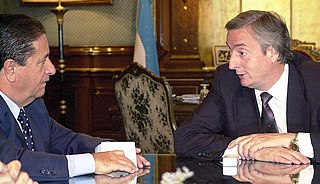
Federal Peronism, or Dissident Peronism, are the informal names given to a political alliance between Justicialist Party figures, currently identified mostly by its opposition to ruling Kirchnerism, the center-left faction that headed the national Government of Argentina from 2003 to 2015, and leads the Peronist movement.

Legislative elections were held in Argentina on 27 October 2013. Open primary elections (PASO) were previously held on 11 August 2013 to determine eligible party lists for the general election. As in 2011 – when such primaries were held for the first time – each party list had to reach a 1.5% threshold at the provincial level in order to proceed to the 27 October polls.
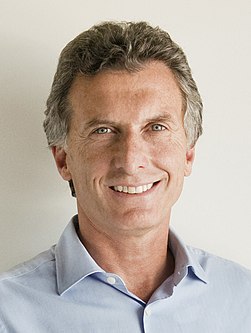
General elections were held in Argentina on 25 October 2015 to elect the President and National Congress, and followed primary elections which were held on 9 August 2015. A second round of voting between the two leading candidates took place on 22 November, after surprisingly close results forced a runoff. On the first runoff voting ever held for an Argentine Presidential Election, opposition leader and Buenos Aires Mayor Mauricio Macri narrowly defeated FPV candidate and Buenos Aires Province Governor Daniel Scioli.

Broad Front UNEN was an Argentine political coalition that unites the Radical Civic Union, Civic Coalition ARI, Proyecto Sur, Freemen of the South Movement, Socialist Party, Authentic Socialist Party, and GEN. The name UNEN is an acronym of "Unión y Encuentro". Founded in April 2014, the purpose of the coalition was to unite the parties that oppose Peronism and Kirchnerism in a single entity, but the inclusion of the center-right party Republican Proposal was a controversial topic among the parties.

On the 25 October elections numerous provinces also elected governors, with the new ones beginning their terms on 10 December 2015. These provinces were Buenos Aires province, Catamarca, Chubut, Entre Ríos, Formosa, Jujuy, La Pampa, Misiones, San Juan, San Luis and Santa Cruz, encompassing 11 of the country's 23 provinces. The other provinces elected governors in different days of 2015; the only exceptions were Corrientes and Santiago del Estero whose governors' terms were not due to finish in 2015.

Legislative elections were held in Argentina on 22 October 2017 to elect half of the Chamber of Deputies and one third of the Senate. The result was a victory for the ruling Cambiemos alliance, being the most voted force in 13 of the 24 districts.
